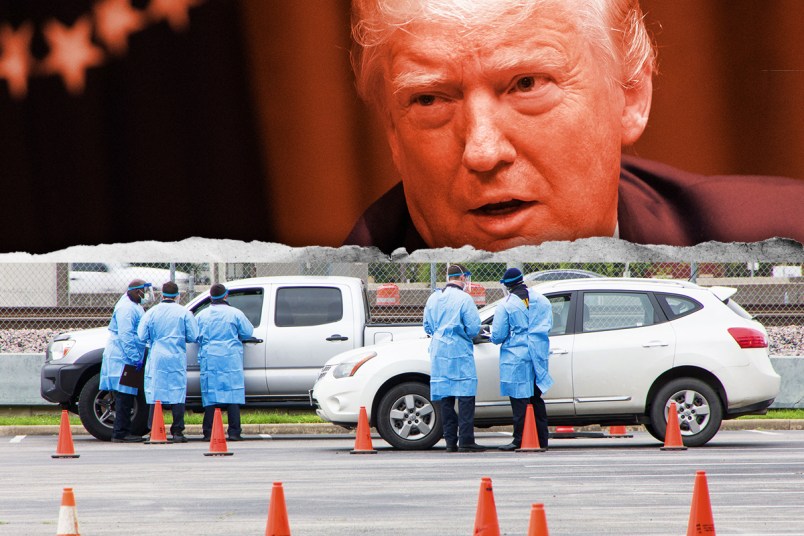The Trump administration is ending funding and support for local COVID-19 testing sites around the country this month, as cases and hospitalizations are skyrocketing in many states.
The federal government will stop providing money and support for 13 sites across five states which were originally set up in the first months of the pandemic to speed up testing at the local level.
Local officials and public health experts expressed a mixture of frustration, resignation, and horror at the decision to let federal support lapse.
Texas will be particularly hard hit by the decision. The federal government gives much-needed testing kits and laboratory access to seven testing sites around Texas. But in the state, which is seeing new peaks in cases, people still face long lines for testing that continues to fail to meet overwhelming demand.
In Dallas County, Texas, the federal government will end support on June 30 for two testing sites it has been been supporting since March, Rocky Vaz, the director of emergency management for the city of Dallas, confirmed to TPM.
“Cases are continuing to rise in Dallas County, and we want to continue with the testing,” Vaz said.
The city of Dallas asked the federal government for an extension beyond June 30, but was refused, Vaz said.
“They told us very clearly that they are not going to extend it,” Vaz said. “We are not expecting it to continue beyond June 30, but things change.”
As the pandemic began to batter the United States in March, the Department of Health and Human Services and the Federal Emergency Management Agency began to deploy Community-Based Testing Sites around the country.
The sites provide testing kits and contract with laboratories and a call center to notify patients of their results. The federal government covers the costs of the contracts, while providing staff.
The Trump administration previously attempted to end support for the testing sites running under the same program in early April. The government reversed the move after a public outcry, extending the sites. The extension is now coming to an end.
Out of a starting number of 41 sites, 13 remain in operation across five states. In addition to Texas’ seven, Illinois and New Jersey each have two, while Colorado and Pennsylvania each have one.
The aid for testing takes a financial burden off of cities and states already buckling under a budget crunch from the pandemic, while boosting testing capacity.
An HHS spokeswoman told TPM that the program aimed to “develop and bring initial testing capabilities to socially vulnerable locations across the country” and said that states were expected to “transition” to control testing by June 30.
She added that the federal government is “broadening” its support for testing by continuing existing policies, including partnering with pharmacies and offering COVID-19 testing at federally qualified health centers.
A FEMA spokesman directed TPM to press releases that the agency had issued about “transitioning” the testing sites from federal to state control.
When TPM asked whether FEMA would adjust extension of the sites in areas where cases have skyrocketed recently, a spokesman acknowledged the inquiry and did not reply further.
President Trump has expressed his opposition to expanding testing, most recently in a tweet Tuesday morning.
Cases are going up in the U.S. because we are testing far more than any other country, and ever expanding. With smaller testing we would show fewer cases!
— Donald J. Trump (@realDonaldTrump) June 23, 2020
In a May report released to Congress, the Trump administration said that it intended to place responsibility for COVID-19 testing on the states.
Testing is an area “where the federal government has the greatest capacity to be helpful,” Gary Slutkin, a former WHO epidemiologist and the CEO Of CURE Violence, told TPM.
“Testing is absolutely essential to everything from diagnosis and treatment to management of the epidemic itself,” Slutkin added. “The withholding of this essential tool for controlling this problem is cruel — it inhibits the ability of a country or a city or a community or a person or healthcare provider to know what to do.”
Like Texas, Colorado will lose its federally supported testing site at the end of June, with testing kits and personnel leaving.
“When it was initially offered to us, the thought process was that this was a stopgap until we could get enough of our own supplies,” Lisa Powell, the program manager for public health emergency preparedness and response for El Paso County, Colorado, told TPM. Powell added that the state’s lower case counts and flattened curve make its situation less dire than that of some other states.
Vaz told TPM that the city of Dallas would likely be forced to dip into CARES Act funding to hire a private contractor to replace the federal help.
“The personnel, the site, the tents, the generators, the kits, the lab work, the patient notification, all of that,” Vaz said, saying that the city of Dallas would end up paying between $130 and $150 per test once the federal help ends. Each site can perform 1,000 COVID tests per day.
“These things cost money,” he added.
Slutkin, the epidemiologist, pointed out to TPM that testing is crucial not only for hotspot areas.
“Testing is important not just in places where cases have expanded, it’s important everywhere in the world regardless of prevalence,” he said. “It is the absolute essential for epidemic control.”






